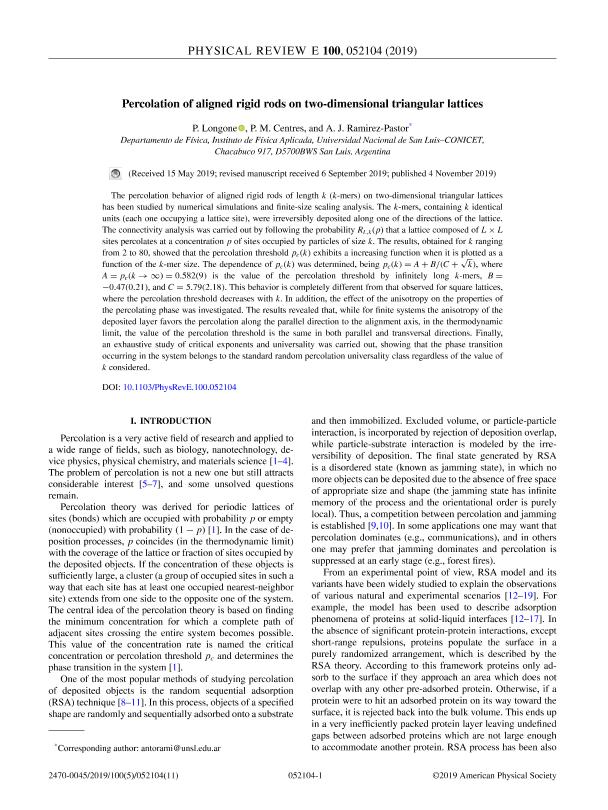Artículo
Percolation of aligned rigid rods on two-dimensional triangular lattices
Fecha de publicación:
04/11/2019
Editorial:
American Physical Society
Revista:
Physical Review. E
ISSN:
2470-0045
e-ISSN:
2470-0053
Idioma:
Inglés
Tipo de recurso:
Artículo publicado
Clasificación temática:
Resumen
The percolation behavior of aligned rigid rods of length k ( k -mers) on two-dimensional triangular lattices has been studied by numerical simulations and finite-size scaling analysis. The k -mers, containing k identical units (each one occupying a lattice site), were irreversibly deposited along one of the directions of the lattice. The connectivity analysis was carried out by following the probability R L , k ( p ) that a lattice composed of L × L sites percolates at a concentration p of sites occupied by particles of size k . The results, obtained for k ranging from 2 to 80, showed that the percolation threshold p c ( k ) exhibits a increasing function when it is plotted as a function of the k -mer size. The dependence of p c ( k ) was determined, being p c ( k ) = A + B / ( C + √ k ) , where A = p c ( k → ∞ ) = 0.582 ( 9 ) is the value of the percolation threshold by infinitely long k -mers, B = − 0.47 ( 0.21 ) , and C = 5.79 ( 2.18 ) . This behavior is completely different from that observed for square lattices, where the percolation threshold decreases with k . In addition, the effect of the anisotropy on the properties of the percolating phase was investigated. The results revealed that, while for finite systems the anisotropy of the deposited layer favors the percolation along the parallel direction to the alignment axis, in the thermodynamic limit, the value of the percolation threshold is the same in both parallel and transversal directions. Finally, an exhaustive study of critical exponents and universality was carried out, showing that the phase transition occurring in the system belongs to the standard random percolation universality class regardless of the value of k considered.
Palabras clave:
PERCOLATION
,
NEMATIC
,
JAMMING
,
PHASE TRANSITION
Archivos asociados
Licencia
Identificadores
Colecciones
Articulos(INFAP)
Articulos de INST. DE FISICA APLICADA "DR. JORGE ANDRES ZGRABLICH"
Articulos de INST. DE FISICA APLICADA "DR. JORGE ANDRES ZGRABLICH"
Citación
Longone, Pablo Jesus; Centres, Paulo Marcelo; Ramirez Pastor, Antonio Jose; Percolation of aligned rigid rods on two-dimensional triangular lattices; American Physical Society; Physical Review. E; 100; 5; 4-11-2019; 1-11; 052104
Compartir
Altmétricas




